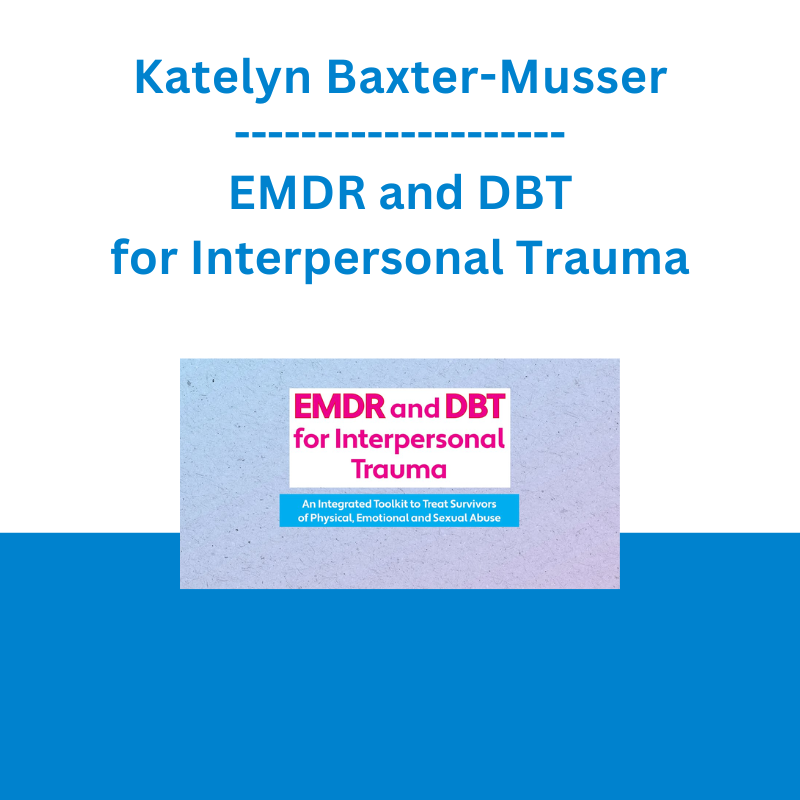*** Proof of Product ***
Exploring the Essential Features of “Katelyn Baxter-Musser – EMDR and DBT for Interpersonal Trauma: An Integrated Toolkit to Treat Survivors of Physical, Emotional and Sexual Abuse”
Speaker: Katelyn Baxter-Musser, LCSW, C-DBT
Duration: 6 Hours 14 Minutes
Format: Audio and Video
Copyright: Oct 06, 2023
Media Type: Digital Seminar – Also available: DVD
Description
Clients who’ve suffered physical, emotional and sexual abuse carry a heavy burden; traumatic memories leaving deep emotional wounds they can struggle to move past.
EMDR can be a lifesaver for these clients, allowing them to process these memories and reclaim their lives.
But even with the best tools, your road to successful treatment isn’t easy. The material is tough. Sessions can get intense. And when sessions end, clients still need to navigate relationships with others (and themselves) that have been complicated by their traumatic pasts.
That’s why if you use EMDR, integrating DBT can be a game-changer – giving you a powerful toolkit for addressing the emotional and relational aspects of interpersonal trauma as you process the traumatic memories they just can’t forget.
Watch this training led by Katelyn Baxter-Musser. Certified in both EMDR and DBT, Katelyn has helped thousands of clinicians get the most out of EMDR and DBT. She’ll provide you a step-by-step guide on how to use DBT skills to enhance the effectiveness of EMDR, resulting in more comprehensive trauma recovery for your clients.
Under Katelyn’s expert guidance you’ll learn how to seamlessly integrate two of today’s most proven approaches, so you can:
- Enhance client readiness for EMDR
- Help clients better manage emotional intensity during EMDR sessions
- Address complex relational issues associated with interpersonal trauma
- Boost distress tolerance skills to support trauma processing
- Improve interpersonal functioning in clients through DBT-informed interventions
- Tailor EMDR and DBT interventions to meet the unique needs of your clients
- Skillfully work with a wide range of clinically challenging trauma clients
Don’t miss this opportunity to take your EMDR therapy to the next level with the DBT skills to make sessions more effective than ever before.
Speaker
Katelyn Baxter-Musser, LCSW, C-DBT
Katelyn Baxter-Musser, LCSW, C-DBT, is a licensed clinical social worker and is certified in dialectical behavior therapy (C-DBT) through Evergreen Certifications Institute and is certified in EMDR. She works in private practice where her areas of expertise include the treatment of trauma, PTSD, depression, anxiety, grief, and relationship issues.
Her DBT training is one of PESI’s most in-demand programs attended by tens of thousands of clinicians worldwide. Ms. Baxter-Musser incorporates DBT into her practice in working with adolescents and adults presenting with a variety of concerns. Her years of experience using DBT principles in her practice have helped her clients to develop healthier coping skills, better process their past traumas, and increase their ability to identify and cope with destructive emotions.
Ms. Baxter-Musser is also an EMDRIA-approved consultant who previously sat on the EMDRIA Standards and Training Committee and was the co-regional coordinator for the EMDRIA Southern Maine Regional Network. She is also a member of the National Association of Social Workers, the American Academy of Experts in Traumatic Stress and the National Center for Crisis Management.
Speaker Disclosures:
Financial: Katelyn Baxter-Musser is the owner, operator, trainer of Inner Awakening Counseling & Consulting. She receives a speaking honorarium and recording royalties from Psychotherapy Networker and PESI, Inc. She has no relevant financial relationships with ineligible organizations.
Non-financial: Katelyn Baxter-Musser is a member of EMDRIA, the National Association of Social Workers, the American Academy of Experts in Traumatic Stress, the National Center for Crisis Management, and the International Society for the Study of Trauma and Dissociation.
PESI and Katelyn Baxter-Musser are not affiliated or associated with Marsha M. Linehan, PhD, ABPP, or her organizations.
Objectives
- Gain a comprehensive understanding of the fundamental concepts and principles of Eye Movement Desensitization and Reprocessing (EMDR) and Dialectical Behavior Therapy (DBT) and explore how these approaches can be effectively integrated to support individuals who have experienced interpersonal trauma.
- Acquire an in-depth understanding of how DBT and EMDR can be utilized to help clients regulate their emotions, reduce trauma triggers, and enhance stability in the face of trauma-related symptoms.
- Review the existing evidence-based research on the efficacy of EMDR and DBT in managing trauma symptomology, and critically analyze their applicability in clinical practice.
- Develop strategies for seamlessly incorporating DBT principles and techniques into the various phases of EMDR therapy, to enhance treatment outcomes for trauma survivors.
- Utilize the biosocial theory of DBT and the Adaptive Information Processing (AIP) model of EMDR to effectively conceptualize and understand the complex needs of clients with interpersonal trauma and create comprehensive treatment plans.
- Identify specific treatment goals and targets that align with the unique needs and challenges of survivors of interpersonal trauma, and tailor therapeutic interventions accordingly to promote healing and recovery.
Outline
Interpersonal Trauma: Neurobiological, Physiological, and Psychological Perspectives
- Exploring physical, emotional, and sexual abuse
- Neurobiological, physiological, and psychological processes involved
- Long-term consequences of interpersonal trauma
- Recognizing risk factors
- Prevalence rates and barriers to disclosure of interpersonal trauma
- Impacts on relationships with others and oneself
Assess for Interpersonal Trauma in the Clinical Setting
- Recognizing warning signs, symptoms, and comorbidities
- Differentiating physical, emotional, and sexual abuse in the clinical context
- Screening and assessment measures for identifying trauma in clients
- Trauma Symptom Inventory
- CAPS
- Dissociative Experiences Scale
- Developing a trauma-informed approach
DBT Skills for Trauma-Related Symptoms, Triggers, and More
Research on DBT and survivors of interpersonal violence
- DBT components and how the biosocial theory relates to trauma
- Goal and targets of treatment
- DBT tools for managing crises and creating safety plans
- DBT validation strategies and creating a safe therapeutic environment
- How DBT helps clients set healthy boundaries
EMDR for Traumatic Memories Related to Interpersonal Violence
- How the AIP model relates to trauma processing
- Characteristics and phases of EMDR
- Goal and targets of EMDR therapy
- Challenges and complexities of working with survivors of IPV
- Managing dissociation and other challenges
- Resourcing and grounding techniques to enhance stabilization and containment
Integrating EMDR and DBT in Trauma Work: Enhancing Resilience and Coping During Stabilization and Trauma Processing
- How EMDR and DBT complement each other
- Assessing clients’ needs and treatment priorities
- Common goals for survivors of interpersonal violence
- DBT treatment planning strategies to identify specific targets for EMDR
- Enhancing EMDR readiness with DBT emotional regulation skills
- DBT coping skills for calm and focus in EMDR sessions
- 5 practical ways to fuse DBT skills directly into EMDR sessions
- Case studies
- Research, risks and limitations
Target Audience
- Counselors
- Social Workers
- Psychiatrists
- Psychologists
- Addiction Counselors
- Marriage and Family Therapists
- Therapists
- Art Therapists
- Physicians
- Nurses
- Other Professionals Who Work within the Mental Health Fields
Please see the full list of alternative group-buy courses available here: https://lunacourse.com/shop/










 Erik Banks - Alternative Risk Transfer
Erik Banks - Alternative Risk Transfer  Oliver Velez - Essential Strategy Of Trade For Life
Oliver Velez - Essential Strategy Of Trade For Life  George Fontanills & Tom Gentile - Optionetics Wealth Without Worry Course
George Fontanills & Tom Gentile - Optionetics Wealth Without Worry Course  Greg Loehr - Advanced Option Trading With Broken Wing Butterflies
Greg Loehr - Advanced Option Trading With Broken Wing Butterflies  Ed Ponsi - Forex Trading
Ed Ponsi - Forex Trading  Money Miracle - George Angell - Use Other Peoples Money To Make You Rich
Money Miracle - George Angell - Use Other Peoples Money To Make You Rich  The Daily Traders – Exclusive Trading Mentorship Group
The Daily Traders – Exclusive Trading Mentorship Group  SMB - Options Training
SMB - Options Training  Atlas API Training - API 570 Exam Prep Training Course
Atlas API Training - API 570 Exam Prep Training Course  Toshko Raychev - Profit System + ITF Assistant
Toshko Raychev - Profit System + ITF Assistant  George Fontanills & Tom Gentile - Optionetics 6 DVD Series Home Study Course (Digital Download)
George Fontanills & Tom Gentile - Optionetics 6 DVD Series Home Study Course (Digital Download)  Team NFT Money - Ultimate NFT Playbook
Team NFT Money - Ultimate NFT Playbook  Racing Workshop - Complete Online Package
Racing Workshop - Complete Online Package  Eduardo Angel - 1 Person Crew Video Productions: 2 The Cinematic Look
Eduardo Angel - 1 Person Crew Video Productions: 2 The Cinematic Look  Matthew Kratter - Trader University
Matthew Kratter - Trader University  Emanuele Bonanni - My Trading Way
Emanuele Bonanni - My Trading Way  Elliottwave - How to Beat Markets Despite Big-News Events
Elliottwave - How to Beat Markets Despite Big-News Events  Matan Feldman - The 13-Week Cash Flow Modeling - Wall Street Prep
Matan Feldman - The 13-Week Cash Flow Modeling - Wall Street Prep  Julie Stoian & Cathy Olson - Launch Gorgeous - Funnel Gorgeous Bundle
Julie Stoian & Cathy Olson - Launch Gorgeous - Funnel Gorgeous Bundle  Trade Like Mike - The TLM Playbook 2022
Trade Like Mike - The TLM Playbook 2022  Henry Clews & Victor Niederhoffer - Fifty Years in Wall Street
Henry Clews & Victor Niederhoffer - Fifty Years in Wall Street  Akil Stokes & Jason Graystone - TierOneTrading - Trading Edge 2019
Akil Stokes & Jason Graystone - TierOneTrading - Trading Edge 2019  Sumedt Jitpukdebodin - Basic Penetration Testing Online Course in Thai language
Sumedt Jitpukdebodin - Basic Penetration Testing Online Course in Thai language  Fred Haug - Virtual Wholesaling Simplified
Fred Haug - Virtual Wholesaling Simplified  War, Peace, and Power - Diplomatic History of Europe, 1500-2000
War, Peace, and Power - Diplomatic History of Europe, 1500-2000  Joel Vazquez - Total Affiliate Domination
Joel Vazquez - Total Affiliate Domination  James L. Rubart - The 5-Year Plan To Become A Bestselling Author
James L. Rubart - The 5-Year Plan To Become A Bestselling Author